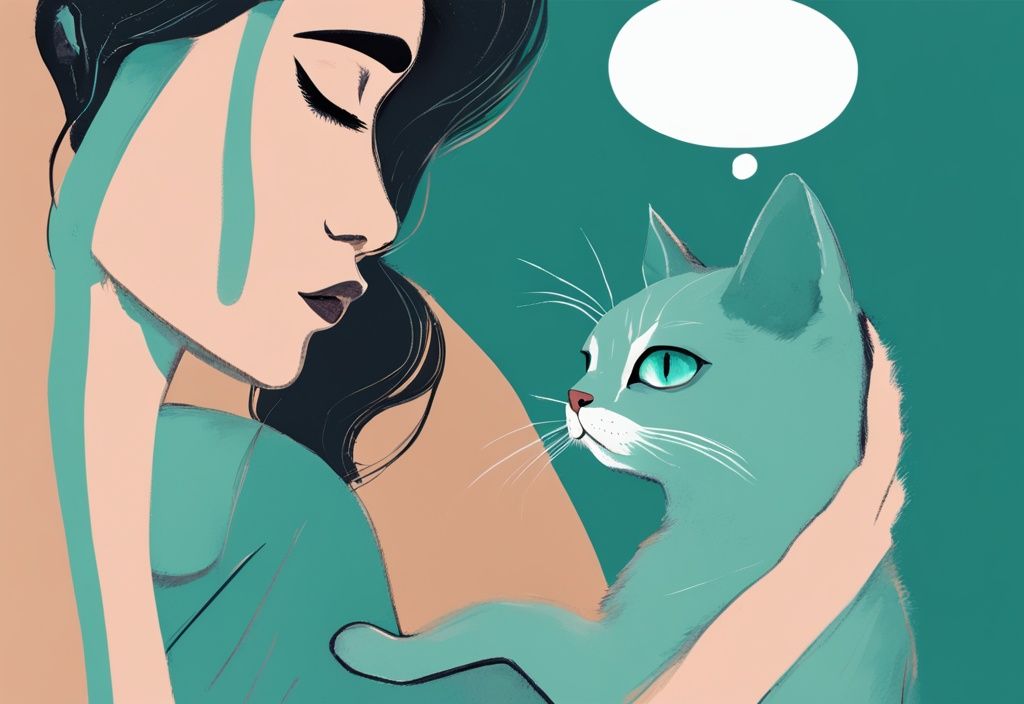Ever notice how each cat seems to have its own purr-sonality? As a fellow cat enthusiast, I’ve always found that fascinating! But, what if our little furbaby suddenly decides they’d rather play the silent game? EOF isn’t a game cats usually play, right? Why doesn’t my cat meow, you might ask yourself.
Just take a breath! It’s possible there’s a simple explanation. Cats can go silent on us for a variety of reasons. Sometimes it’s health-related, sometimes it’s related to stress, and other times it’s just their unique feline way of being.
So, stick around as we purr-sue probable reasons behind this kitty conundrum. We’ll also discuss when it might be a good idea to ring up your vet. Let’s see if we can decode the silence of the kitties together!
Possible Health Reasons: Why Your Cat Isn’t Meowing
There can be various health-related reasons for your cat’s sudden silence. Let’s dive into some of them and figure out what might be going on with your feline friend.
Signs of Upper Respiratory Infection (URI)
Upper Respiratory Infections (URIs) in cats can come with a barrage of symptoms like coughing, sneezing, swollen eyes, lethargy, and nasal discharge. These pesky infections often leave your kitty hoarse or even completely voiceless. Imagine Whiskers, my cuddly rescue cat, suddenly going silent—it would be quite a scare! Recognizing these signs is vital since URIs can hit your cat’s vocal cords hard. If your fur baby exhibits these symptoms and has stopped meowing, a URI might be the culprit.
Hyperthyroidism: A Silent Illness
Hyperthyroidism often takes older cats by surprise, manifesting in weight loss, increased appetite, restlessness, and sometimes even changes in their vocalization. This condition tweaks the thyroid gland, causing an overflow of thyroid hormones, turning your chatty cat unnervingly quiet as the disease advances. If your senior cat is munching more but shedding pounds and showing vocal changes, hyperthyroidism might be at play.
How Laryngeal Paralysis Affects Cat’s Vocalization
Laryngeal paralysis, where nerve damage zaps the larynx, can seriously mess with your cat’s meow. Picture this: voice changes, coughing, and breathing struggles. It’s a rough ride for both you and your cat as it muddles their main communication tool. Early detection is key here. Spotting laryngeal paralysis early can make all the difference in managing the condition and keeping your kitty’s quality of life in check.
Throat Conditions: Tumors or Polyps
Throat conditions like tumors or polyps can throw a wrench into your cat’s vocalization.
These growths can cause hoarseness, coughing, and breathing issues. Imagine Max, my Border Collie, tugging at his naughty cat friend with growing concern due to hoarse meows or complete silence—alarming, right? Be vigilant about persistent coughing or visible throat changes; early detection is crucial for tackling these obstructions.
The Role of Chronic Illnesses in Feline Silence
Chronic illnesses like kidney disease and diabetes can sap your cat’s energy, leading to a noticeable drop in meowing. These conditions can make your otherwise chatty kitty unusually quiet due to sheer exhaustion. Keep a sharp eye on changes in appetite, weight, and bathroom habits. Early detection means you can start treatment sooner, nudging your furry friend back to their perky, vocal self.
Understanding Respiratory Infections or Viruses in Cats
Respiratory infections or viruses can drastically alter your cat’s meowing patterns. Think hoarse meows or losing the voice entirely. Watch for sneezing, nasal discharge, and lethargy—these are red flags. These infections can be warriors against your cat’s health and vocal prowess, so prompt veterinary attention is essential if these symptoms make an appearance.
Is it Natural? Variations in Cat Vocalization
– Ever wondered why some cats are chatterboxes while others are the strong, silent type? Just like people, cats have their own unique personalities, which can make their vocal habits quite different.
Cats Who Love Silence: Naturally Quiet Felines
– Think of cats as little furry individuals, each with their own quirks. Some cats, much like our human introverts, simply prefer the quiet life. These naturally quiet felines might not meow much, if at all. They often communicate with their eyes, a twitch of the tail, or a gentle nuzzle. So, if you’re scratching your head and wondering why doesn’t my cat meow, it might just be their laid-back, reserved nature.
How Cats Use Meowing to Communicate with Humans
– Believe it or not, cats have us wrapped around their little paws with their meows. They’ve figured out that meowing is a great way to grab our attention, request some tasty treats, or just share a moment. Yet, don’t be surprised if some cats choose other methods to communicate. Maybe it’s the soft purr when they’re happy, or the way they wind around your legs. These less vocal cats are still masters of expression; they just have a different way of saying, “Hey, I’m here!” Understanding these cues can be a game-changer when contemplating why doesn’t my cat meow often.
Role of Breed Characteristics in Cat Vocalizations
– Let’s talk breeds! Just like how some dogs are more vocal than others, the same goes for our feline friends. Breeds like the Siamese are notorious for their chatty, expressive nature. On the other hand, a Birman or Maine Coon might take the quieter route. This breed-specific behavior is a big piece of the puzzle in figuring out why doesn’t my cat meow as much as others. It’s all about natural variations and the charming traits that come with different breeds of cats.

The Impact of Environment and Behavior on Cat’s Meowing
Curious about why your cat isn’t meowing? Let’s dive into the fascinating world of feline vocalization. From stress to sudden changes, many factors can influence your cat’s meowing habits. Understanding these can help you bring back that familiar and comforting sound.
Stress and Its Effect on Cat Vocalization
Ever noticed how Whiskers becomes uncharacteristically silent when there’s a new pet in the house? Stress is a biggie when it comes to a cat’s vocal behavior. When stressed, cats often retreat into themselves, and their once chatty nature can quiet down significantly.
Stress factors can range from new household members to changes in daily routines. Addressing and relieving these stressors can bring your kitty’s voice back in no time. Keep an eye out for stress signs to make life a bit easier for your feline friend.
Reading the Signs: Is Your Cat Stressed?
Is your cat’s silence a silent scream for help? If Whiskers isn’t meowing, it’s time to play detective. Check for changes in appetite, grooming habits, and energy levels. Stress can make cats lose interest in food, forget to groom, or even become lethargic.
Also, watch out for weight loss—this can be a red flag for deeper issues. Take note, and you might just uncover the mystery behind your cat’s quiet behavior.
Understanding How Changes Can Silence Your Cat
Picture this: you’ve just moved to a new house, and suddenly your chatty cat goes mute. Environmental changes can have a major impact on a cat’s vocal habits. From rearranging furniture to shifting homes, everything counts.
To help Whiskers adapt, keep some constants in their lives. Favorite toys and comfy bedding can work wonders in providing a sense of security. A little stability goes a long way in encouraging cats to express themselves vocally again.
Trauma Effects: The Silent Aftermath
Ever seen a cat go silent after a scary run-in with a neighbor’s dog? Trauma can cause a cat to lose their voice or meow less. Accidents, aggressive encounters, and even significant disruptions can leave lasting impressions.
Recovery isn’t immediate. Patience, a calm environment, and gradual reintroduction to routine activities can help your kitty regain confidence and, along with it, their voice. It’s all about making them feel safe and loved again.

Veterinary Consultation: When Silence is a Call for Help
Ever wondered why doesn’t my cat meow anymore? I know, it can be quite a head-scratcher, especially if your furry friend’s quietness just came out of nowhere! Consulting your vet is essential. A dramatic shift in your cat’s vocal habits can be more than a personality quirk—it might signal some underlying health problems that need immediate attention.
Knowing When to See a Vet
When should you make that vet appointment? If your cat, usually a chatterbox, suddenly goes silent, it’s definitely time to see the vet. It’s not just the lack of meowing that’s worrisome—you might notice other changes like your kitty being more tired, eating less, or even having breathing issues. Catching these signs early can make all the difference in keeping your cat healthy and happy.
Diagnostic Tests: What They Say About Your Cat’s Silence
Diving deeper, the vet might run several diagnostic tests to get to the bottom of why your cat isn’t meowing. Blood tests could hint at thyroid problems or infections. If the urine test shows anomalies, it might be pointing towards kidney issues or diabetes. Imaging tests like X-rays or ultrasounds can reveal if there are any physical obstacles such as tumors or polyps in the throat or respiratory tract. These tests are like detective tools, uncovering the mystery behind your cat’s sudden silence.
Why Regular Vet Check-ups Matter
Here’s where regular vet visits become a game-changer. These check-ups aren’t just routine—they’re your best bet in catching potential health hiccups before they turn into serious issues. Preventative care such as vaccinations, dental checks, and overall physical exams can help nip problems in the bud that could lead to your cat losing its voice. Ensuring your feline friend stays healthy means more purrs and, hopefully, more meows too!
Looking for Other Signs: Alternative Communication Methods
Ever wondered, “why doesn’t my cat meow?” Understanding this can be a bit of a puzzle since our feline friends have a plethora of communication tricks up their furry sleeves. Not just vocalizations, but also through purrs, trills, chirps, and a rainbow of non-vocal cues.
Different Cat Sounds: Purrs, Trills, Chirps
While meowing is their go-to for chatting with humans, cats have a symphony of other sounds:
- Purrs: Often a signal of happiness, but sometimes, it’s their way of saying they’re stressed or unwell. Crazy, right? The key is in the context!
- Trills: Those adorable, short high-pitched sounds. It’s like your cat is saying a cheerful “hello” or trying to catch your attention with affection.
- Chirps: Usually happen when your kitty is excited or a tad frustrated, like when bird-watching from the window. It’s their inner hunter’s cry of excitement.
Reading Your Cat: Body Language and Facial Expressions
Your quiet kitty is still quite the chatterbox—just in a more subtle way. Body language can scream louder than a meow. Here are some classic feline cues:
- Ears: Perked forward means they’re curious and alert. Flat against the head? They’re scared or might be feeling a bit aggressive.
- Tails: A high, quivering tail is your cat’s version of a smile and a warm welcome. But a bushy, fluffed-up tail? It’s a clear sign of fear or agitation.
- Eyes: Slow blinking is their way of giving kitty kisses. Dilated pupils? Excitement or fear is brewing.
- Posture: A relaxed kitty, paws tucked under, is a picture of calm. But an arched back or puffed-up fur? Proceed with caution, they’re feeling defensive.
Understanding Your Cat’s Silent Language
So if you’re scratching your head and thinking, “why doesn’t my cat meow,” pay close attention to their silent signals:

- Touch: Rubbing and head-butting are all about marking you as theirs and showing some love and trust.
- Gestures: Pawing at you? They might be asking for attention or letting you know they need something.
- Routine Behavior: Any shifts in their daily habits like eating or grooming? These can be quick indicators of how they’re feeling health-wise or emotionally.
Cracking the code of these non-vocal cues can unwrap the mystery of your quiet little buddy, making sure they’re not just surviving, but thriving and feeling all the love they need.
Encouraging Your Cat’s Meows
Befuddled as to why your feline friend stays mum while other cats chirp up a storm? Let’s delve into some playful ways to encourage your kitty to vocalize more.
The Role of Interaction in Encouraging Vocalization
Interaction and engagement can do wonders in getting your cat to find its voice. Think of it as a duet—spend quality time with your furball, initiating playful sessions and attuning to their needs. Regular chats can spark their interest to meow back, given that cats meow predominantly to communicate with their humans. So, shower them with affection or treats when they respond with a meow, reinforcing this vocal behavior. This way, your kitty will learn that their adorable meows bring delightful rewards and are more likely to vocalize in the future.
Testing and Encouraging Your Cat’s Vocal Capacities
You might find it intriguing to put your cat’s vocal capacities to the test with some fun experiments. What if ignoring their soft meows nudges them to belt out a louder one for your attention? Or try engaging them with interactive toys or feather wands—these can ignite excitement and provoke those cute meows. Such playful methods can boost your cat’s confidence in using their voice, making them more vocal and communicative.
Teaching Your Cat: Quiet Meows as Learned Behavior
Quiet meows can sometimes be the result of learned behavior, especially if those soft sounds have consistently garnered your attention. To flip the script, embrace positive reinforcement. Shower your feline with cuddles, treats, or playtime when they meow a bit louder and try to dial down attention on quieter sounds. Gradually, your cat will associate louder meows with positive vibes, leading to more robust vocal expressions to capture your love and attention.
Through these techniques, you’ll be nurturing your cat’s vocal abilities, ensuring a more expressive and joyful bond between you and your furry companion. Doesn’t that sound just purrfect?
FAQs
My cat is naturally quiet. Should I be worried?
Honestly, if your feline friend has always been on the quieter side and isn’t showing any signs of illness, there’s usually no need to fret. Just like humans, some cats are naturally more introverted and prefer using body language and purrs to communicate. It’s just their unique personality shining through!
My cat stopped meowing suddenly, what should I do?
If your once-chatty cat suddenly goes silent, it’s time to play detective and consult your vet. Rapid changes in behavior can sometimes signal underlying health problems. Alongside that, pay attention to any extra symptoms or recent changes in their environment that might be the culprit.
Can stress make my cat stop meowing?
Absolutely! Just like us, our furry friends can be sensitive to stress. New pets, shifts in household dynamics, or even a recent move can all lead to a quieter kitty. It’s their way of coping with the sudden change, and it’s totally normal.
How can I tell my cat is sick if she isn’t meowing?
Capturing subtle signals is key. Keep an eye on your cat’s appetite, grooming habits, and energy levels. Even slight changes, like nasal discharge or coughing, can be red flags. Whiskers, my cuddly rescue cat, always gives herself away by snuggling more when she’s under the weather. Trust your instincts and observe closely.
Are some cat breeds more silent than others?
Absolutely, some breeds are known to be more composed. For instance, Birman and Maine Coon cats are often quieter, while Siamese cats can be quite the chatterboxes. Breed traits definitely play a role in how vocal your cat might be, just like how my Border Collie, Max, loves to “talk” with his expressive barks!
